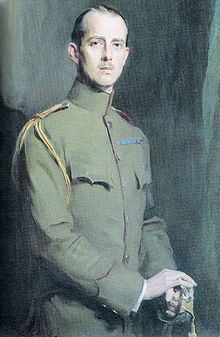Prince Andrew of Greece and Denmark
| Prince Andrew | |
|---|---|

Portrait by Philip de László, 1913
|
|
| Born |
2 February 1882 O.S.: 20 January 1882 Old Royal Palace, Athens, Kingdom of Greece |
| Died | 3 December 1944 (aged 62) Metropole Hotel, Monte Carlo, Monaco |
| Burial | Royal Cemetery, Tatoi Palace, Athens, Greece |
| Spouse | Princess Alice of Battenberg |
| Issue |
Margarita, Princess of Hohenlohe-Langenburg Theodora, Margravine of Baden Cecilie, Hereditary Grand Duchess of Hesse Sophie, Princess George of Hanover Prince Philip, Duke of Edinburgh |
| House | Glücksburg |
| Father | George I of Greece |
| Mother | Olga Constantinovna of Russia |
| Religion | Greek Orthodox |
|
Styles of Prince Andrew of Greece and Denmark |
|
|---|---|
| Reference style | His Royal Highness |
| Spoken style | Your Royal Highness |
| Alternative style | Sir |
Prince Andrew of Greece and Denmark (Andreas; 2 February 1882 (N.S.) – 3 December 1944) of the House of Schleswig-Holstein-Sonderburg-Glücksburg, was the seventh child and fourth son of King George I of Greece and Olga Constantinovna of Russia. He was a grandson of Christian IX of Denmark and father of Prince Philip, Duke of Edinburgh.
He began military training at an early age, and was commissioned as an officer in the Greek army. His command positions were real appointments rather than honorary, and he saw service in the Balkan Wars. In 1913, his father was assassinated and Andrew's elder brother, Constantine, became king. Dissatisfaction with his brother's neutrality policy during World War I led to his brother's abdication and most of the royal family, including Andrew, was exiled. On their return a few years later, Andrew saw service in the Greco-Turkish War (1919–1922), but the war went badly for Greece, and Andrew was blamed, in part, for the loss of Greek territory. He was exiled for a second time in 1922, and spent most of the rest of his life in France.
By 1930, he was estranged from his wife, Princess Alice of Battenberg. His only son, Prince Philip, served in the British navy during World War II, while all four of his daughters were married to Germans, three of whom had Nazi connections. Separated from his wife and son by the effects of the war, Andrew died in Monte Carlo in 1944. He had seen neither of them since 1939.
Prince Andrew was born at the Old Royal Palace in Athens on February 2, 1882, the fourth son of George I of Greece. He was taught English by his caretakers as he grew up, but in conversations with his parents he refused to speak anything but Greek. He also spoke German, Danish, Russian, and French. He attended cadet school and staff college at Athens, and was given additional private tuition in military subjects by Panagiotis Danglis. Despite his short-sightedness, Andrew joined the army as a cavalry officer in May 1901.
...
Wikipedia

